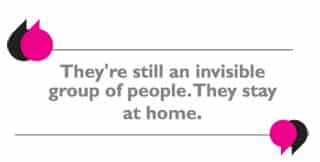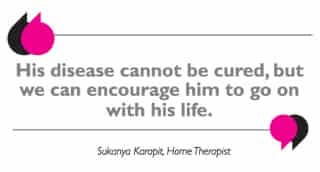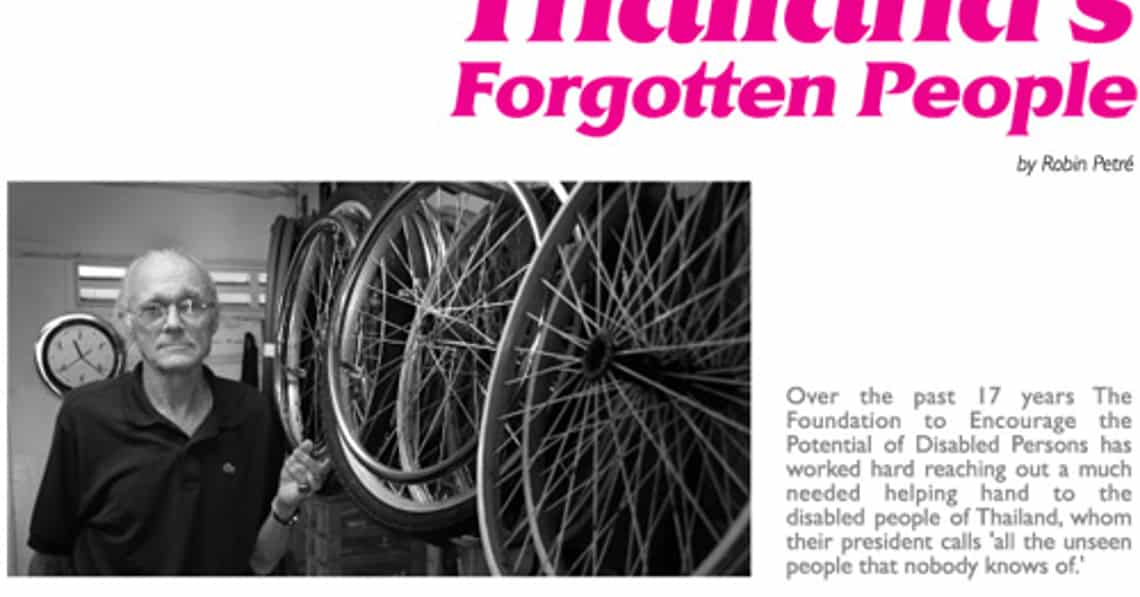Seventy-seven year old Don Willcox begins his work at a dawn-breaking six in the morning…seven days a week. For over a decade and a half, Willcox has focused his life on finding ways to help people in the north of Thailand who are neglected by family or society as a whole. He says, “I brought a child who had spastic cerebral palsy to a legitimate private hospital in Chiang Mai because he had an epileptic attack, and the paediatrician there said, ‘Why are you interfering? Why don’t you let him die?'”
This attitude is one of many challenges that American-born Willcox has encountered through his work with disabled people in Thailand. He is the founder, fundraiser and President of The Foundation to Encourage the Potential of Disabled Persons, which was legally registered in Chiang Mai in 1993. The foundation has come a long way since then.
“Everybody in northern Thailand knows what we’re doing. We get phone calls every day. We don’t go out looking for people anymore, they find us now,” says Willcox, who is ready to retire as soon as he’s found an adequate successor.
By the end of last year, the foundation had given away an estimated number of more than 3,000 custom made ability aids for free, and published eight self-help books for disabled people. They had also visited more than 2,500 disabled people at their homes, helping them with all kinds of things in their everyday lives.
Visiting the unseen people
On her grey Honda motorbike, 39-year-old Sukanya Karapit manages to visit four families a day. The petite woman used to work as a professional masseuse before she became the home therapist for the foundation’s Home Visit Programme. Every Friday, she spends two hours at bed-bound Watcharapol Prasanwut’s house. He suffers from muscular dystrophy that robbed him of the ability to walk.
“His disease cannot be cured, but we can encourage him to go on with his life,” says Sukanya while she rubs Watcharapol’s limbs and covers his back with hot compresses.

A blurry TV-screen, a broad wheelchair, empty cups and laundry hung out to dry on every hook and corner available, clutter up the tiny room that he shares with his 7-year-old cousin. One wall is covered with pictures of HM the king and monks in saffron robes. Watcharapol has only left the house once since he was first unable to walk when he was in his early twenties – well over a decade ago.
“Sukanya helps me a lot,” he says with a smile while petting one of five small dogs that surround him. “I have trouble turning myself over at night. Her massage relieves the sore muscles I get from sleeping on only one side.”
For the disabled people of the 24 families that Sukanya goes to see every week, her visits mean helping doing simple things like taking a shower, cutting hair and brushing teeth. Things that most of us take for granted, but few would want to be without.
Willcox has a photo album with picture after picture of the foundation’s staff helping and supporting disabled people in their own homes. One picture shows a 28-year-old disabled woman receiving hugs from the staff.
“Sometimes we just do things like hug somebody, because nobody wants to touch them,” Willcox says, adding that one of the problems with attitudes disabled people have to contend with is because “Disabled people do not produce an income. They are a burden on the family.”

Giving the freedom of mobility
From his wheelchair, Mongkol Chompookhot skilfully swings his hammer, bending straight metal plates into a U-shape. The small workshop is lit up by radiant sparks springing from the welding gun as his assistant prepares another metal plate for shaping.
“With two or three people working together, we can make around six wheelchairs a month,” Mongkol says.
He came to work here nine years ago, after a motorcycle accident left him unable to walk when he was in his mid-twenties. Now, at the age of 36, he is the manager of the Freedom Wheelchairs Workshop, an initiative of the foundation that remains the only one of its kind in northern Thailand. The workshop is not limited to wheelchair construction alone, but builds any kind of disability aid imaginable, from wheeled beds and ramps to crutches and walkers. Every single piece of equipment is custom made.
“Mongkol is brilliant. He can make anything,” Willcox says.
Donating a wheelchair gives people more than just mobility. It gives them both freedom and dignity.
“We’re able to give wheelchairs to people of all ages, also the elderly. It’s quite lovely to see their life return. To see them out in public gossiping instead of lying on the floor at home. To see that hope come back into their eyes when they become able to communicate and be independent,” says Willcox.
The cost of a single wheelchair sponsorship is USD 280, or around 8,400 baht, which includes home visits to determine the needs of the individual, wheelchair usage instructions and lifelong wheelchair maintenance service. All this is free of charge for the disabled person.
“Everybody is very happy with what we are doing now because it’s not complicated. When we have somebody who can’t walk, who is crawling around on the floor, we give them mobility, and our job is done. It’s always a success story, we never have a failure,” Willcox says.
Your handicap is your own problem
Before they started the Freedom Wheelchairs Workshop ten years ago, the foundation offered a range of different classes for disabled people. 20-30 people would come by the centre daily to take classes in English, basic computer skills, singing, how to play the guitar and much more.
The idea was to educate the disabled and help them start up in a business that they would eventually take over. Unfortunately, and for various reasons, this project was too challenging. “Sometimes, disabled people would come to me and say, ‘What’s the point? Now I’m clever, I can speak English, I can make a website, but nobody will hire me. I was much happier before when I was dumb,'” Willcox says.
Many employers refrain from hiring somebody stuck in a wheelchair because they aren’t interested in spending extra money turning their workplace into a disability friendly space with ramps and other facilities. Willcox jumps to his feet, a tall, lean figure vividly waving his hands in the air as to both illustrate and underline his point when describing their attitude: “Why would I, when I can just hire a normal person?”
In the mid-nineties, as Willcox became increasingly aware of the living conditions for disabled people in Chiang Mai, he noticed that the blue and white disabled parking sign was missing all over the city. When he encouraged the Chiang Mai airport manager to get disabled parking spaces, he was met with an unambiguous answer: Absolutely no. If somebody can’t walk, it has to be their own problem.
“I bought the damn paint and the paintbrush, and I painted on the soi myself at the airport. Then they said, ‘As long as you pay for it and take care of it, no problem.’ So that was how we started. Now they have it everywhere. It has become a status symbol, because the country and the attitude have changed,” Willcox says.
Surely, the Thai attitude towards disabled people has improved since the foundation was first established, but their job is far from done.
Much is left for improvement
After his retirement, Don Willcox will continue helping out where he lives at the Baan Piranan, a home for children with severe cerebral palsy that he started together with his Thai life partner two years ago as a project of the foundation’s. She is to take over the position as president and thereby have financial control of the foundation. However, the foundation will still need a new fundraiser.
Willcox insists that his successor be somebody who cares about this country and about disabled people like he does. Preferably somebody who’s disabled himself.
“I don’t eat pizza every day and I don’t live on Nimmanhaemin Road. I go to the same wat and eat the same food as the Thais do. Every neighbour of mine is a Thai. This is my country. If I can find someone who cares like that, that is the first thing he needs to do. The second thing is to raise the money,” he says.
Just to keep the place running, Willcox needs to raise approximately 1,500,000 baht every year. About 90 percent of the money comes from sponsors abroad.
“I will probably have a foreigner replace me. I would have loved to have a Thai, but Thais themselves have warned me not to do that. Thais are very good at spending money, but not so good at bringing it in,” he says.
For Willcox, closing down the foundation is not an option. He points out that disabled people are still discriminated against in Thailand and that they need help and support.
“They’re still an invisible group of people. They stay at home. The government promotes ‘the unseen Thailand’ as all these beautiful places that nobody visits, but another part of the unseen Thailand is all the people who have been forgotten,” says Willcox.
“We can’t close down and just write the building off. We have worked so hard.”
_____________________________________________________________
If you are interested in the position as The Foundation to Encourage the Potential of Disabled Persons fundraiser, or wish to donate a wheelchair, feel free to reach Don Willcox on assist@loxinfo.co.th or telephone 086 185 5852.
